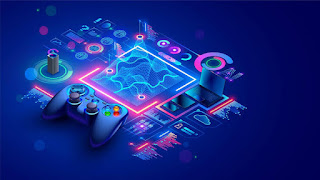AI Game Development- Enhancing NPC: The Role of AI in Creating Dynamic Non-Player Characters
Enhancing NPC Behavior: The Role of AI in Creating Dynamic Non-Player Characters
In the realm of video games, Non-Player Characters (NPCs) play a pivotal role in shaping the player's experience. From providing quest lines to engaging in combat, NPCs contribute significantly to the game's narrative, immersion, and overall gameplay dynamics. Traditionally, NPCs have been scripted with predefined behaviors and responses, often leading to predictable interactions that can detract from the game's realism and player engagement. However, with advancements in Artificial Intelligence (AI), particularly machine learning and neural networks, game developers are now able to create NPCs that exhibit more dynamic and lifelike behaviors, enhancing the overall gaming experience.
Evolution from Scripted to Dynamic NPCs
Historically, NPCs in video games have been scripted with specific routines and dialogue trees. These scripts dictate how NPCs behave under certain conditions, such as reacting to the player's actions or following predetermined paths in the game world. While effective in providing structured gameplay experiences, scripted NPCs can feel repetitive and lack the flexibility to adapt to player choices in real-time.
AI-driven approaches, on the other hand, enable NPCs to learn and evolve based on interactions with players and their environment. Machine learning algorithms allow NPCs to analyze player behavior patterns, predict possible actions, and adjust their responses accordingly. This adaptability leads to more dynamic interactions where NPCs can exhibit emotions, make decisions based on situational context, and even learn from their mistakes.
Techniques for AI-Enhanced NPC Behavior
Reinforcement Learning
Reinforcement learning is a prominent AI technique used in game development to train NPCs to achieve specific goals or behaviors through trial and error. In this approach, NPCs receive rewards or penalties based on their actions, encouraging them to learn optimal strategies over time. For example, in a combat scenario, NPCs can learn to dodge attacks, choose effective weapons, or coordinate with other characters based on the outcomes of previous encounters.
Neural Networks for Behavior Prediction
Neural networks are another powerful tool for enhancing NPC behavior. By processing vast amounts of gameplay data, NPCs can be trained to recognize complex patterns in player behavior and predict future actions. This capability allows NPCs to anticipate player movements, adapt to changing circumstances, and provide more personalized interactions. For instance, in a role-playing game, NPCs can dynamically adjust their dialogue options or quest recommendations based on the player's progress and choices.
Natural Language Processing (NLP)
NLP techniques enable NPCs to understand and generate natural language, enhancing their ability to engage in meaningful conversations with players. NPCs can interpret spoken or typed inputs from players, respond contextually, and even generate dialogue that aligns with their personality traits or role in the game world. This level of interaction not only enriches storytelling but also strengthens the player's immersion in the game environment.
Benefits of AI-Enhanced NPCs
The integration of AI into NPC development offers several compelling benefits:
Enhanced Realism: AI-driven NPCs can exhibit more human-like behaviors, such as adapting to unpredictable player actions or expressing emotions based on in-game events.
Increased Player Engagement: Dynamic NPCs that respond intelligently to player interactions contribute to a more immersive gaming experience, encouraging players to invest more deeply in the game's narrative and world.
Adaptive Gameplay: AI-enhanced NPCs can create personalized challenges and quests tailored to individual player preferences, leading to more varied and satisfying gameplay experiences.
Efficiency in Development: While initially requiring investment in AI development and training, AI-powered NPCs can ultimately reduce the need for extensive manual scripting and testing, streamlining the game development process.
Challenges and Considerations
Despite its promise, integrating AI into NPC behavior presents challenges and considerations for developers:
Computational Resources: AI algorithms can be resource-intensive, requiring robust hardware and software infrastructure to ensure smooth gameplay performance.
Ethical Concerns: Developers must consider ethical implications, such as ensuring NPCs do not exhibit biased or discriminatory behaviors based on real-world data or societal norms.
Balancing Realism and Gameplay: Striking a balance between realistic NPC behaviors and maintaining enjoyable gameplay mechanics is crucial to avoid overwhelming players with overly complex interactions.
Future Directions
Looking ahead, the future of AI in NPC development holds exciting possibilities. Advances in AI research, coupled with the increasing power of hardware platforms, are expected to further refine NPC behaviors and interactions. Emerging technologies such as emotional AI and more sophisticated neural network architectures will likely enable NPCs to exhibit even deeper emotional intelligence and adaptive learning capabilities.
In conclusion, AI integration is transforming NPC development in video games by enabling the creation of dynamic, lifelike characters that enhance immersion, engagement, and overall gameplay quality. As developers continue to explore and innovate with AI techniques, players can anticipate richer, more personalized gaming experiences where NPCs evolve alongside their interactions and decisions within the virtual worlds they inhabit.
Comment your view on this blog to improve ourselves 🙏 and thanks for reading our Blog...
We're the one who gives you a perfect view on developing your unique game 🎮 with AI.
#AIinGames
#GameDevelopment
#EthicalAI
#TechEthics
#GamingIndustry
#AIethics
#GameDev
#DigitalEthics
#PlayerWellbeing
#DataPrivacy
#DiversityInTech
#InclusiveGaming
#TechForGood
#ResponsibleAI
#GameDesign






Comments
Post a Comment